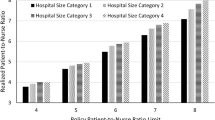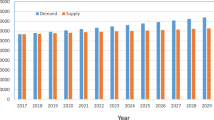Abstract
Most proposals to reform health care delivery center on a robust, well-designed primary care sector capable of reducing the health and cost consequences of major chronic illnesses. Ironically, the intensified policy interest in primary care coincides with a steep decline in the proportion of medical students choosing primary care careers. Negativity stemming from the experience of trying to care for chronically ill patients with complex conditions in poorly designed, chaotic primary care teaching settings may be influencing trainees to choose other career paths. Redesigning teaching clinics so that they routinely provide high quality, well-organized chronic care would appear to be a critical early step in addressing the looming primary care workforce crisis. The Chronic Care Model provides a proven framework for such a redesign, and has been, with organizational support and effort, successfully implemented in academic settings.
Similar content being viewed by others
REFERENCES
Rittenhouse DR, Shortell SM, Fisher ES. Primary care and accountable care--two essential elements of delivery-system reform. N Engl J Med. 2009;361(24):2301–3.
Friedberg MW, Hussey PS, Schneider EC. Primary care: a critical review of the evidence on quality and costs of health care. Health Aff (Millwood). 2010;29(5):766–72.
Fields D, Leshen E, Patel K. Analysis & commentary. Driving quality gains and cost savings through adoption of medical homes. Health Aff (Millwood). 2010;29(5):819–26.
Keirns CC, Bosk CL. Perspective: the unintended consequences of training residents in dysfunctional outpatient settings. Acad Med. 2008;83(5):498–502.
Weinberger SE, Smith LG, Collier VU. Redesigning training for internal medicine. Ann Intern Med. 2006;144(12):927–32.
Whitcomb ME, Cohen JJ. The future of primary care medicine. N Engl J Med. 2004;351(7):710–12.
Grant RW, Buse JB, Meigs JB. University HealthSystem Consortium Diabetes Benchmarking Project T. Quality of diabetes care in U.S. academic medical centers: low rates of medical regimen change. Diabetes Care. 2005;28(2):337–442.
Renders CM, Valk GD, Griffin SJ, Wagner EH, Van Eijk JT, Assendelft WJ. Interventions to improve the management of diabetes in primary care, outpatient, and community settings: a systematic review. Diabetes Care. 2001;24(10):1821–33.
Bodenheimer T, Wagner EH, Grumbach K. Improving primary care for patients with chronic illness: the chronic care model, Part 2. JAMA. 2002;288(15):1909–14.
Wagner EH. Chronic disease management: what will it take to improve care for chronic illness? [editorial]. Eff Clin Pract. 1998;1(1):2–4.
Wagner EH, Austin BT, Von Korff M. Organizing care for patients with chronic illness. Milbank Q. 1996;74(4):511–44.
Wagner EH, Austin BT, Davis C, Hindmarsh M, Schaefer J, Bonomi A. Improving chronic illness care: translating evidence into action. Health Aff. 2001;20(6):64–78.
Coleman K, Austin BT, Brach C, Wagner EH. Evidence on the Chronic Care Model in the new millennium. Health Aff (Millwood). 2009;28(1):75–85.
Phillips LS, Branch WT, Cook CB, et al. Clinical inertia. Ann Intern Med. 2001;135(9):825–34.
O'Connor PJ, Sperl-Hillen JM, Johnson PE, Rush WA, Biltz G. AHRQ. Clinical Inertia and Outpatient Medical Errors. Advances in Patient Safety. 2005;2005:2.
Unutzer J, Katon W, Callahan CM, et al. Collaborative care management of late-life depression in the primary care setting: a randomized controlled trial. JAMA. 2002;288(22):2836–45.
American Academy of Family Physicians (AAFP), American Academy of Pediatrics (AAP), American College of Physicians (ACP), American Osteopathic Association (AOA). Joint principles of the Patient-Centered Medical Home 2007.
Johnson JK, Woods DM, Stevens DP, Bowen JL, Provost LP, Sixta CS, Wagner EH. Joy and challenges in improving chronic illness care: Capturing daily experiences of academic primary care teams. J Gen Intern Med 2010; XX:xxxx-xxxx
DiPiero A, Dorr DA, Kelso C, Bowen JL. Integrating systematic chronic care for diabetes into an academic general internal medicine resident-faculty practice. J Gen Intern Med. 2008;23(11):1749–56.
Warm EJ, Schauer DP, Diers T, et al. The ambulatory long-block: an accreditation council for graduate medical education (ACGME) educational innovations project (EIP). J Gen Intern Med. 2008;23(7):921–6.
Chen EH, Thom DH, Hessler DM, Phengrasamy L, Hammer H, Saba G, Bodenheimer T. Using the teamlet model to improve chronic care in an academic primary care practice. J Gen Intern Med. 2010; XX:xxxx-xxxx
Yu GC, Beresford R. Implemetation of a chronic illness model for diabetes care in a Family Medicine residency program. J Gen Intern Med. 2010; XX:xxxx-xxxx
Nutting PA, Miller WL, Crabtree BF, Jaen CR, Stewart EE, Stange KC. Initial lessons from the first national demonstration project on practice transformation to a patient-centered medical home. Ann Fam Med. 2009;7(3):254–60.
ACKNOWLEDGMENTS
Funded in part by the California HealthCare Foundation.
Author information
Authors and Affiliations
Corresponding author
Rights and permissions
About this article
Cite this article
Wagner, E.H. Academia, Chronic Care, and the Future of Primary Care. J GEN INTERN MED 25 (Suppl 4), 636–638 (2010). https://doi.org/10.1007/s11606-010-1442-6
Published:
Issue Date:
DOI: https://doi.org/10.1007/s11606-010-1442-6




